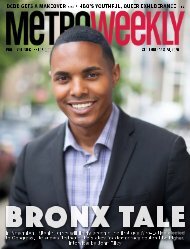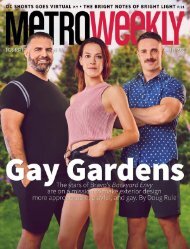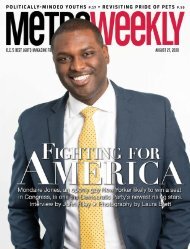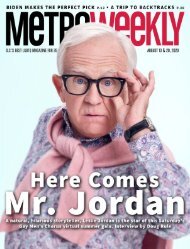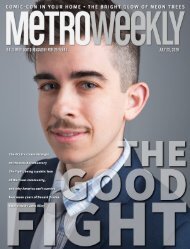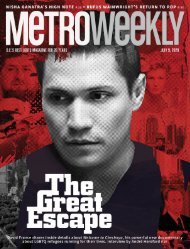Victory Fund's Annise Parker - Metro Weekly - July 16 2020
Cover Story: Annise Parker rose to become Houston’s first LGBTQ mayor. Now leading the Victory Fund, she’s helping others reach even higher. Interview by John Riley Also: The newly-rechristened Chicks return with a comeback album that showcases their greatest strengths.
Cover Story: Annise Parker rose to become Houston’s first LGBTQ mayor. Now leading the Victory Fund, she’s helping others reach even higher. Interview by John Riley
Also: The newly-rechristened Chicks return with a comeback album that showcases their greatest strengths.
You also want an ePaper? Increase the reach of your titles
YUMPU automatically turns print PDFs into web optimized ePapers that Google loves.
COURTESY OF VICTORY FUND<br />
tion, but it would always be after the jump. With all due respect,<br />
nobody reads after the jump. So if they could get you into it that<br />
far, you don't care anymore, you're already hooked. So the coverage<br />
changed. And I raised enough money in that race to go up on<br />
TV, control my own message in a way that I had never been able<br />
to do before. And that's how I was able to be successful.<br />
MW: Did your opponents make an issue of your sexuality?<br />
PARKER: Every piece of literature I put out had some reference<br />
to the resume — "past president, Houston Gay and Lesbian<br />
Political Caucus” — with the word gay and lesbian in every piece<br />
of literature I put out. But also “employee, Mosbacher Energy<br />
Company,” and, by that point, I was president of the largest civic<br />
association in Houston.<br />
It meant people stopped talking about my sexual orientation.<br />
My opponents couldn't talk about it because, “You know, she's a<br />
lesbian.” “Well, duh. It says so right on her own literature.” So it<br />
changed the conversation. There were actually six other people<br />
in that race, and it became more like, “Well, it’s not a problem<br />
to me that she's a lesbian, it shouldn't matter to anybody.” They<br />
had to figure out some way to bring it up without looking like<br />
complete asses doing it.<br />
The weekend of the runoff election, I was against a Republican<br />
businessman who had all the Downtown backing, and I had all<br />
but two of the minority-elected officials in the region who were<br />
with me because I had helped them with their campaigns over<br />
the years. He put out an attack piece, only to black households,<br />
and it was one of those comparison pieces: he was the family<br />
man, I was single. He belonged to his church, I had no known<br />
religious beliefs. This contrast, to say, basically, that I was a lesbian.<br />
And only to black households. I still got 75 percent of the<br />
black vote.<br />
I’d already gathered the support of the leadership. But also,<br />
because of my work on housing issues and neighborhood issues<br />
as a volunteer, I had a network. My best volunteers in that race<br />
were senior citizens. I was a United Way volunteer in senior<br />
services, and I’d had lunch at every senior center in Houston.<br />
I sat there and played dominoes with those little old ladies. So<br />
they were with me. It was a nine-month campaign built upon a<br />
network and a resume built over 20 years.<br />
MW: After you were elected to the Houston City Council, you eventually<br />
became controller and then mayor. What was the nature of<br />
your political battles during those years?<br />
PARKER: City government is the most functional level of government,<br />
because it has to be. It’s about getting trash picked up. It’s<br />
about filling potholes. It’s about making sure that basic services<br />
are performed. I would submit that during my entire 18 years in<br />
full-time public life and three positions, that if you just followed<br />
the votes that were cast in city hall, it was impossible to tell how<br />
people lined up politically. There were philosophical divides<br />
and there were certain things like birth control in city clinics, or<br />
afterschool programs where there was never a pure Republican<br />
or Democratic divide, but where you could see conservative and<br />
more progressive divisions.<br />
But I realized I had spent so long as an activist and as a<br />
spokesperson for the community, that I had to very consciously,<br />
when I assumed office, change my role and change my mindset<br />
— that I wasn't going to be a spokesperson for the LGBTQ community.<br />
I was going to be open, but I wasn’t the spokesperson.<br />
My job was to represent my constituents.<br />
I did engage whenever LGBTQ issues came up, like moving<br />
our Pride Parade from a daytime parade to a nighttime parade.<br />
We had to rewrite city ordinances to do it. Once the community<br />
made the decision to do what they wanted to do and came to me,<br />
then it was my responsibility to make it happen.<br />
28<br />
JULY <strong>16</strong>, <strong>2020</strong> • METROWEEKLY.COM




